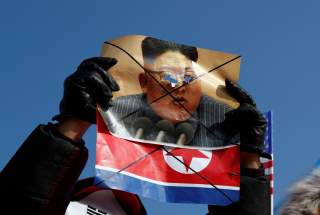Want to Take on North Korea? Engage Its People.
Washington should play the long game, instead of seeing military action as the easy answer.
In theory exemptions are available for humanitarian activities. But the exceptions are few and worries remain. Heidi Linton, who manages Christians for Korea, said “Humanitarian activities are being seriously jeopardized, and Christian organizations like ours face additional challenges.”
Another member of the Linton family, connected to Korea through missionaries going back to the late nineteenth century, Stephen Linton, founder of the Eugene Bell Foundation, expressed concern that now Pyongyang will know that any group involved is in the North only at the sufferance of Washington: “Getting permission from the government to go puts an X mark on your back because the North Koreans will never believe that you are there just for humanitarian purposes if the government gave you permission to go.”
In some cases organizations have decided to give up. For instance, the Pyongyang University of Science and Technology no longer is recruiting Americans, who once made up half of the faculty. Until the ban, about sixty Americans either served on the staff or were family members of employees. Other staffers were affected too, explained Colin McCulloch, Director of External Relations: “Some others are not returning, for the present, due to security concerns and their sending agencies’ risk assessments.”
Truly bizarre was the Trump administration’s decision to ban North Koreans from America. Since the DPRK does not allow its citizens to leave, there is no queue of would-be immigrants. In 2015 fifty-five North Koreans gained residency status: roughly half were family members of American citizens, with the rest having a mix of refugee and employment status. About 100 nonimmigrant visas were issued the same year, divided among diplomats and visitors coming for business/tourism. Since the ban serves no security purpose—despite Pyongyang’s failure to follow U.S. security procedures, the formal justification, no one imagines North Korean refugees turning into radical terrorists—it is widely seen as being designed to disguise the administration’s true objective of targeting selected Islamic nations.
If the Trump administration is serious about eliminating North Korea as a threat, it should encourage more international contact. The point is not that any result is predetermined or inevitable. But the best hope for peaceful change may be transformation within, even to a more normal authoritarian regime with a less threatening external posture. While the North Korean system remains tough, it looks brittle, undermined by defections and held together by executions. Few expected the Berlin Wall to fall or the Soviet Union to dissolve when they did. The Ceausescu dictatorship in Romania appeared resilient, until, suddenly, it wasn’t. Washington should play the long game, instead of seeing military action as the easy answer.
Banning travel to the North was a mistaken response to a tragedy. Said Christine Ahn, coordinator of Women Cross DMZ, “While the motivation behind the United States’ ban on travel to North Korea is understandable—no one wants to see another American suffer like Otto Warmbier—it is counterproductive to the broader objective of securing peace in the region.”
Washington should encourage Western contact with North Koreans, whatever other policies are being advanced. For instance, Thae Yong-ho advocated “maximum engagement” with the DPRK’s leadership and people even while pressing for “maximum pressure.” He views expanded access to information as a vehicle for change. So should the United States.
There is no simple answer to the challenge posed by North Korea. Certainly not war—nor isolation. The more Americans visit the DPRK, the harder for the “Hermit Kingdom” to seal out seditious foreign thoughts.
Doug Bandow is a Senior Fellow at the Cato Institute. A former Special Assistant to President Ronald Reagan, he is author of Tripwire: Korea and U.S. Foreign Policy in a Changed World and co-author of The Korean Conundrum: America’s Troubled Relations with North and South Korea.
Image: Reuters
Recommended:
Why North Korea's Air Force is Total Junk

